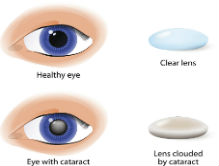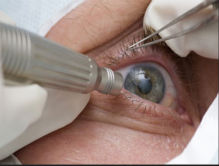What is cataract?
Cataract is one of the most common diseases of the eye that affects a sizable section of the world’s population. Although most cataracts appear in patients above 40 years of age, paediatric cataract is not a rare phenomenon either. So what exactly is cataract and how does it affect the eyes? Here’s all the information you’ll need.
-

Cataract symptoms - Common Signs
The symptoms of cataract largely depend on the type of cataract that’s developing in the lens. Not all cataracts are alike. While for some people, it develops in the center of the lens others could develop it around the lens’ periphery while few others might have it at the back of their lens. Some of the most common symptoms, however, are blurry/clouded vision, sensitivity to bright light, dull appearance of colours, change in spectacle prescription, etc. In case of paediatric cataract, you’ll find that the kid does not react well to light or colourful objects. If you notice one or more of these symptoms, please visit your eye doctor and get a check-up done immediately.
-

Cataract prevention - Myth or Magic?
Prevention of cataract is an arguable subject. While there’s no concrete proof on what could reduce the risk of cataract, there’s no harm in practicing a healthy lifestyle that includes a diet rich in nutrients, antioxidants, vitamins and omega 3 fatty acids along with some exercise and ample sleep. If not reducing the risk of cataract, there’s a good chance that your quality of life will be greatly improved with these minor inclusions in your routine!
-

Cataract treatment - Regain your Vision
Cataracts can be easily treated with a simple surgery. After your initial rounds of consultation, you’ll be counselled for surgery depending on the severity of your condition. On the day of surgery, you’ll be prepped and given local anaesthesia. Your eye surgeon will perform a process called phacoemulsification during which the cloudy lens is removed and replaced with a clear man-made focussing lens. These artificial lenses (called as intraocular lens implant, or IOL) remain permanently inside your eye and do not degrade. The entire process takes less than 30 minutes and is absolutely painless. Cataract surgery is usually a day care procedure, which means that you will go home on the day of your operation. However, you may wish to arrange for someone to stay overnight with you at home on the day of surgery.
